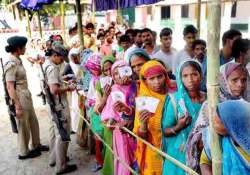Bihar polls: Lalu-Nitish have an edge over NDA on paper in 5th phase
New Delhi: The fifth and final phase of Bihar Assembly elections will take place on November 5. A total of 57 seats will undergo polls in this phase.Since these seats mainly fall under Kosi and

New Delhi: The fifth and final phase of Bihar Assembly elections will take place on November 5. A total of 57 seats will undergo polls in this phase.
Since these seats mainly fall under Kosi and Seemanchal regions , dominated by Muslims and Yadavas, there is a clear advantage for grand-alliance, at least on paper. But there is a caveat here. The grand-alliance can sweep the fifth phase only if it's game is not spoiled by three important players in this region – Tariq Anwar of Nationalist Congress Party (NCP), Pappu Yadav of Jan Adhikar Party (Loktantrik) and Asaduddin Owaisi of AIMIM.
These three may not have a pan-Bihar presence but they have significant following in their respective pockets. For example, Tariq Anwar is influential in Katihar Lok Sabha area which has 6 Assembly seats. In 2014, he led in 5 Assembly constituencies and was second in the sixth constituency. This time, he is contesting separately and may spoil the party for the grand-alliance in this region.
Pappu Yadav who has formed his own outfit, Jan Adhikar Party (Loktantrik), is also popular among Yadavas of Kosi region. Last time, he won on RJD ticket from Madhepura by defeating Sharad Yadav of JD(U). He can cut into Yadav votes in Kosi region that will only benefit BJP-led NDA. Pappu Yadav is also believed to have significant following in Seemanchal region and his strident anti-Lalu stand may once again work in favour of NDA in this region.
Out of these 57 seats, 24 seats fall in Seemanchal region which has 40% Muslim votes on an average. This region should have been a cakewalk for the grand-alliance but there are multiple headaches for them in this part. First, AIMIM of Asaduddin Owaisi is contesting on 6 seats which will only divide Muslim votes that would benefit BJP-led NDA. Second, there are 6 Muslim candidates, on an average, in every constituency of this region. The presence of so many Muslim candidates will only make the task that much difficult for the grand-alliance.
The BJP knows that it can succeed in this region only if the party succeeds in consolidating Hindu votes in view of a clear polarization of majority of Muslim votes in favour of grand-alliance. That was the reason why Amit Shah made a deliberate remark that “crackers would burst in Pakistan, should BJP lose Bihar”. It was a clear attempt on part of Shah to polarize and consolidate Hindu votes.
In 2010 Assembly elections, the BJP had won 24 seats out of these 57 seats. In 2014 Lok Sabha elections, BJP-led NDA led in 18 seats only. At that time RJD and JD(U) were fighting separately. If we add their votes, they were leading in 44 seats together. Obviously, this region is kind of a stronghold for the grand-alliance.
But as we know, electoral politics does not follow the rules of arithmetic all the time. It's more of chemistry in most cases. On paper, grand-alliance has a definite advantage but there are many significant ifs and buts that can spoil their game. On top of everything, if Amit Shah succeeds in polarizing Hindu votes then the tide may actually turn in favour of BJP because in that case it will change the entire political discourse in this region.